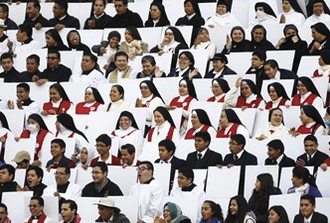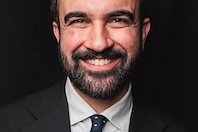Mexico: Pope advises clergy, religious not to get entrenched in their sacristies

Huge crowds of people lined up along the motorcade route cheering and waving Vatican flags as the Holy Father arrived in Morelia, the capital of Michoacan State on Tuesday. Michoacan is at the heart of Mexico's drug-trafficking route, a region wracked by poverty, unemployment, drug violence and corruption. The Pope celebrated Mass with priests, seminarians and religious men and women in the city's 'Venustiano Carranza' Stadium.
In his homily the Pope told those present that their lives "speak of prayer" and that "the school of prayer is the school of life." Acknowledging that "temptation can come to us from places often dominated by violence, corruption, drug trafficking, disregard for human dignity, and indifference in the face of suffering and vulnerability", Pope Francis urged the clergy and all consecrated persons never to succumb to "resignation".
"A resignation which paralyzes us and prevents us not only from walking, but also from making the journey; a resignation which not only terrifies us, but which also entrenches us in our "sacristies" and false securities; a resignation which not only prevents us from proclaiming, but also inhibits our giving praise. A resignation which not only hinders our looking to the future, but also thwarts our desire to take risks and to change. And so, "Our Father, lead us not into temptation" he said.
Tapping into the value of memory which can "help us to look at the 'stuff' of which we are made" Pope Francis recalled one Mexican evangelizer, Bishop Vasco Vazquez de Quiroga, who was known as "the Spaniard who became an Indian."
Among the Indians, the Pope said, he was known as "Tata Vasco", which in the Purhépechan language means Father.
"The situation of the Purhépechas Indians, whom he described as being "sold, humiliated, and homeless in marketplaces, picking up scraps of bread from the ground", far from tempting him to listless resignation, succeeded in kindling his faith, strengthening his compassion and inspiring him to carry out plans that were a "breath of fresh air" in the midst of so much paralyzing injustice. The pain and suffering of his brothers and sisters became his prayer, and his prayer led to his response" he said.
Please find below the full text of the Pope's homily:
There is a saying which goes "tell me how you pray, and I will tell you how you live; tell me how you live and I will tell you how you pray. Because showing me how you pray, I will learn to find the God for whom you live, and showing me how you live, I will learn to believe in the God to whom you pray". For our life speaks of prayer and prayer speaks of our life. Praying is something learned, just as we learn to walk, to speak, to listen. The school of prayer is the school of life and in the school of life we progress in the school of prayer.And when Paul used to speak to his favourite disciple, Timothy, when he used to teach him and exhort him to live his faith, he would say to him: "Remember your mother and your grandmother". And when Seminarians used to enter the Seminary, often they used to ask me: "Father, I would like to pray in a deeper, more mental way...". "Carry on praying the way they taught you at home. And slowly your prayer with grow just as you grew in your life". One learns to pray, just as we learn to live.
Jesus wished to introduce his companions into the mystery of Life, into the mystery of His life. He showed them by eating, sleeping, curing, preaching and praying, what it means to be Son of God. He invited them to share his life, his interiority, and in his presence among them he allowed them to touch, in his flesh, the life of the Father. He helped them to experience, in his gaze, in his going out in power, the newness of saying "Our Father". In Jesus this expression has no trace of routine or mere repetition. On the contrary, it contains a sense of life, of experience, of authenticity. With these two words, "Our Father", he knew how to live praying and to pray living.
Jesus invites us to do the same. Our first call is to experience this merciful love of the Father in our lives, in our experiences. His first call is to introduce us into the new dynamic of love, of sonship. Our first calling is to learn to say, "Our Father", that is, Abba.
"Woe to me if I do not preach the Gospel!", says Saint Paul, "Woe to me!". For to evangelize, he continues, is not a cause for glory but rather a need (1 Cor 9:16).
He has invited us to share in his life, his divine life, and woe to us if we do not share it, woe to us - consecrated men and women, priests, seminarians, bishops, woe to us - if we are not witnesses to what we have seen and heard, woe to us. We are not and do not want to be "administrators of the divine", we are not and do not want to be God's employees, for we are invited to share in his life, we are invited to enter into his heart, a heart that prays and lives, saying, "Our Father". What is our purpose if not to say with our lives. From the beginning to the end, like our brother bishop who died last night, what is mission if not to say it with our lives, "Our Father"?
He who is Our Father, it is he to whom we pray every day with insistence: Lead us not into temptation. Jesus himself did the same thing. He prayed that his disciples - yesterday's and today's - would not fall into temptation. What could be one of the sins which besets us? What could be one of the temptations which springs up not only in contemplating reality but also in living it? What temptation can come to us from places often dominated by violence, corruption, drug trafficking, disregard for human dignity, and indifference in the face of suffering and vulnerability? What temptation might we suffer over and over again when faced with this reality which seems to have become a permanent system?
I think we can sum it up in a word, "resignation". Faced with this reality, the devil can overcome us with one of his favourite weapons: resignation. A resignation which paralyzes us and prevents us not only from walking, but also from making the journey; a resignation which not only terrifies us, but which also entrenches us in our "sacristies" and false securities; a resignation which not only prevents us from proclaiming, but also inhibits our giving praise. A resignation which not only hinders our looking to the future, but also thwarts our desire to take risks and to change. And so, "Our Father, lead us not into temptation".
How good it is for us to tap into our memories when we are tempted. How much it helps us to look at the "stuff" of which we are made. It did not all begin with us, nor will it all end with us, and so it does us good to look back at our past experiences which have brought us to where we are today.
And in this remembering, we cannot overlook someone who loved this place so much, who made himself a son of this land. We cannot overlook that person who could say of himself: "They took me from the tribunal and put me in charge of the priesthood for my sins. Me, useless and quite unable to carry out such a great undertaking; me, who didn't know how to use an oar, they chose me to be the first Bishop of Michoacán" (Vasco Vázquez de Quiroga, Pastoral Letter, 1554).And I would like to thank the Cardinal Archbishop because it is was his wish that this Eucharist be celebrated with this man's chalice).
With you, I would like to recall this evangelizer, first known as "the Spaniard who became an Indian".
The situation of the Purhépechas Indians, whom he described as being "sold, humiliated, and homeless in marketplaces, picking up scraps of bread from the ground", far from tempting him to listless resignation, succeeded in kindling his faith, strengthening his compassion and inspiring him to carry out plans that were a "breath of fresh air" in the midst of so much paralyzing injustice. The pain and suffering of his brothers and sisters became his prayer, and his prayer led to his response. Among the Indians, he was known as "Tata Vasco", which in the Purhépechan language means, Father, dad, daddy...
It is to this prayer, to this expression, that Jesus calls us.
Father, dad, daddy... lead us not into the temptation of resignation, lead us not into the temptation of losing our memory, lead us not into the temptation of forgetting our elders who taught us by their lives to say, "Our Father."
Source: VIS















